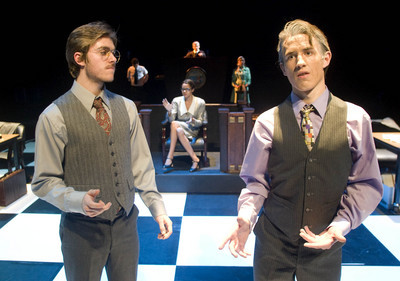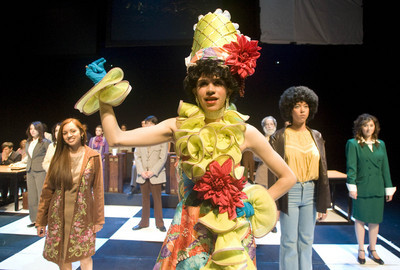Courtroom Production
Two murders, one trial and a flash point for fierce debate over the flaws of America's criminal justice system, gay rights, seismic shifts in the social order and Twinkies.
The People vs. Dan White, who was convicted of the 1978 slayings of San Francisco Mayor George Moscone and city supervisor Harvey Milk, addressed them all in a trial that redefined the short journey from profound to ridiculous.
"One of the reasons I picked it was because of its historical impact," says Robert Connor, director of "Execution of Justice," which exposes the absurdity of the case beginning tonight at Las Vegas Academy of International Studies, Visual and Performing Arts. "A lot of students don't know what's gone on before the day they were born. Things they enjoy now in regard to rights, be they civil rights or gay rights, are byproducts of the Harvey Milk-George Moscone murders, and legislation that was passed because of it."
The openly gay Milk and the liberal Moscone, who appointed several women, gays, lesbians and minorities to city commissions and advisory boards, were targeted by the conservative, blue-collar White, an ex-cop, firefighter and Army veteran, after he resigned his position as city supervisor. But White reversed himself and requested Moscone reinstate him. When Milk and others lobbied against it, Moscone refused to reappoint White, who then shot Moscone in his office, reloaded and walked to Milk's office, where he shot Milk five times. White then left City Hall and confessed at the police station where he'd been an officer.
"Dan White and people like him were reacting to their own peril in a reality that the world was changing," Connor says. "The power had always been with white males, and he's under attack from these subgroups. He was desperate to regain control because he saw the world he knew falling apart."
An upcoming movie on the case will star Sean Penn as Milk and Josh Brolin as White, but playwright Emily Mann's journalism-theater hybrid -- similar as a docudrama to "The Laramie Project," about the murder of Matthew Shepard -- incorporates court transcripts and multimedia effects to put the trial on trial and finds it guilty of miscarriage of justice to an obscene degree.
White was convicted of voluntary manslaughter, dodging two first-degree murder raps and sentenced to less than eight years (he served a little more than five). The verdict was partially blamed by outraged observers on the oft-derided "Twinkie defense," in which his consumption of the fluffy cakes and the potential homicide-inducing properties of sugary snacks were cited as triggering his murderous rage.
(Some say the media misreported this as directly causal, the defense claiming it was White's depression that led to diminished capacity and drove him to the slaughter, and that his junk diet was merely symptomatic of how deeply White, a one-time health and fitness advocate, had lapsed into mental illness.)
"It is interesting directing it, because many of the lines in the play are actual lines that people said in history, and often what we say in real life is not as exciting and entertaining as words written by playwrights," says Connor, whose production includes video, still photos and music underscoring the action. "I encourage the actors not to take on the notion that they're acting, but consider the circumstances these people went through. And the defense and prosecuting attorneys address the audience, because we're trying to bring the audience into the courtroom."
"Justice" crystallizes how White was staunchly defended by the police department -- the chief homicide inspector was a witness for White's character, while the prosecutor sought no such testimony for the victims, who were perceived as outsiders by the public.
"The entire trial was baloney," says Kelley Malloy, who plays White, who committed suicide in 1985. "It's tough to play such a conflicted character, because he knows he killed two people and he's throwing this crackpot defense out there, and he got lucky. But there's a scene with his confession to his best friend, the chief of homicide, where I find a little sympathy for him because of how defeated and at his wit's end he is."
Though based on the trial, Mann's play removes extraneous testimony and inserts "uncalled witnesses" who illustrate White's lack of remorse.
"I don't think he necessarily wanted to lose," says Ryan Wesen about his character, prosecutor Thomas Norman, whose political career tanked after the trial. "It was more that he thought it was such an easy case because the facts were so clear it was murder, so he got caught with his pants down. The way I'm playing it, I don't think it was purposeful."
As for defense attorney Douglas Schmidt, his portrayer doesn't find him devious despite the reviled Twinkie defense. "He wasn't really a veteran lawyer," says Aaron Fentress. "He was afraid of losing the case, and I think he liked Dan White and actually believed in him."
Crime, social justice and snack cakes -- that's jurisprudence.
Contact reporter Steve Bornfeld at sbornfeld@reviewjournal.com or (702) 383-0256.
what: "Execution of Justice" when: 7 p.m. today, Saturday, Thursday and April 25-26 where: Lowden Theater for the Performing Arts, Ninth Street and Clark Avenue tickets: $12 (800-585-3737)
















